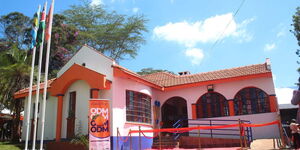As the country continues to ponder on what will happen to Margret Nduta, the Kenyan who was busted with two kilograms of cocaine in Vietham, more questions continue to emerge on the plausibility of an expatriate to avoid the death penalty in the strict Middle-Eastern nations.
Despite Nduta's claims of being unaware of the contents of a suitcase she was travelling with, she was found guilty of drug trafficking and subsequently sentenced to death on March 6 2025 by the People's Court in Ho Chi Minh City.
As of Tuesday, March 18, 2025, her execution date had lapsed, with the Kenyan government still making last-ditch efforts to save her life. The Ministry of Foreign Affairs recently announced it had activated diplomatic channels through Kenya’s embassy in Thailand - dispatching a team to Hanoi in a desperate attempt to secure clemency.
But can Nduta escape the death penalty? This question can only be answered comprehensively after the Vietnam government's response to the Kenyan government's requests.
Nduta's story draws eerily similar comparisons to another case involving Deborah Donde, the daughter of former Gem Member of Parliament Joe Donde. In 2006, Deborah was detained by Malaysian authorities alongside her friend on allegations that they were dealing Marijuana in the country.
At the time, the two girls were arrested while staying at the house of a Saudi Arabian friend in Cyberjaya, near Kuala Lumpur. Police seized 4 kilograms of Marijuana in the process, leading to the duo's arrest.
The incident made headlines in Kenya at the time, since Deborah was a high-profile name particularly because her father was the immediate former Gem MP. The case attracted the attention of the government, with Kenya’s Minister of Foreign Affairs at the time under President Mwai Kibaki’s administration Raphael Tuju confirming the two students would be arraigned with state-hired lawyers behind them.
Like in Vietnam, drug trafficking in Malaysia is a serious crime, which can attract hefty penalties, including death. Notably, the laws are so strict around drugs, that a person caught with large quantities of drugs are presumed to be trafficking. In this case, they can face the death sentence.
With the magnitude of punishment in mind, the stakes were high for Deborah, 18, and her friend, who found some reprieve after tests for marijuana came back negative. The negative drug test was revealed by the former Gem MP in November 2006.
Deborah's case can easily be classified as one involving a lucky escape since drug suspects in Malaysia rarely come out unscathed.
By 2006, the nation had reportedly executed over 100 culprits on drug-related charges since laws were enacted in 1981. Foreigners constituted a third of that figure.
Around that same time, another Kenyan - a fourth-year Bachelor of Arts student at the University of Nairobi was slapped with a life sentence after admitting to possessing 1.8 kilogrammes of heroin.
After her release, Deborah did an interview with 98.4 Capital FM where she refuted claims that she was a drug dealer, saying she was simply 'at the wrong place at the wrong time'.












